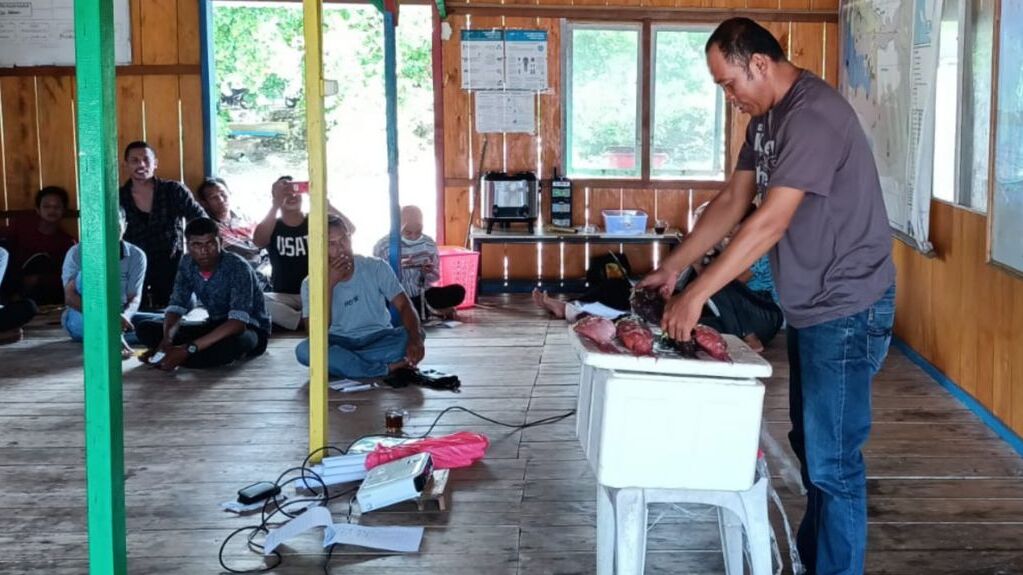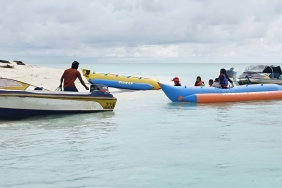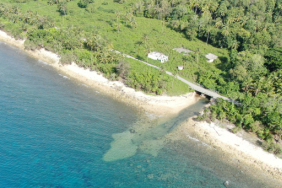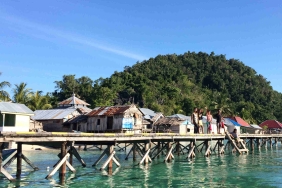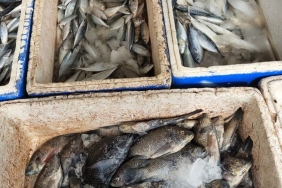SHARING BEST PRACTICE KNOWLEDGE IN MARINE RESOURCE MANAGEMENT TO CONSERVATIONISTS IN WAKATOBI DISTRICT
Wakatobi Regency in Southeast Sulawesi, is part of the World Coral Triangle region. Quoted from the Central Bureau of Statistics of Southeast Sulawesi Province, the marine biodiversity, scale and condition of coral reefs in Wakatobi occupy one of the highest priorities for marine conservation in Indonesia. Located west of the Banda Sea and north of the Flores Sea, Wakatobi Regency has 4 main inhabited islands, namely Wangi-Wangi, Kaledupa, Tomia and Binongko Islands (WaKaToBi). With an area of 1,390,000 hectares, divided into 97% water and 3% land, Wakatobi is dubbed by the world as "The Real Underwater Paradise in the Center of the World's Coral Triangle".
With this very important marine potential, the management of existing resources in Wakatobi certainly needs to be done wisely and sustainably. Not only to maintain the balance of the marine ecosystem, but also for the welfare of the surrounding communities who depend on the sea for their livelihoods.
Supporting the efforts of sustainable management of Wakatobi's natural resources, WWF Indonesia Foundation on November 15-24, 2022 in collaboration with the Government of Wakatobi Regency and the Wakatobi Marine and Fisheries Community Academy (AKKP) conducted a series of training as part of the Wakatobi MPA CoE (Marine Protected Area Center of Excellence). The training, which was attended by 30 participants, was conducted with resource persons from various institutions, including AKKP Wakatobi, Regional Research and Development Planning Agency (Bappeda), National Disaster Management Agency (BNPB), Kahedupa Toudani Forum (Forkani), Samata Padakkau Cooperative, Lagundi, Dewara, and Sarano Wali Customary Law Community (MHA).
Four Themes of Training Materials
The simultaneous training was attended by individuals and representatives of groups actively managing natural resources in the fields of tourism, seaweed cultivation, capture fisheries, and customary law communities in Wakatobi.
There were 4 main themes in this training, namely community development, corporations, biodiversity, and governance. Each theme was then divided into several sessions that included theoretical presentations and practical activities.
Elfian, a resource person from the capture fisheries community from Samata Padakkau Cooperative explains the process of handling fresh reef fish starting from data collection of fish species, measuring the length of weight to good packing methods before the fish is sent to buyers in Makassar, South Sulawesi.
The exemplary figure of the aquaculture community from Wangi Wangi Wakatobi, La Juma, when delivering material on the practice of grass cultivation starting from making seedling gardens, planting methods, maintenance to post-harvest.
The community development theme was divided into several sessions, including community organizing, sustainable livelihoods, Locally Managed Marine Areas (LMMAs), Community Supervisory Groups (Pokmaswas), seaweed cultivation, community-based marine tourism, and sustainable capture fisheries training. Meanwhile, the corporate theme is divided into training on sustainable fisheries management and marine tourism management.
On the biodiversity theme, the training included sessions on aquatic ecosystems, as well as training on conservation of protected and endangered marine biota. On the governance theme, the training covers disaster mitigation and climate change adaptation efforts in coastal areas.
The various materials presented are expected to enrich the insights and knowledge of the people of Wakatobi on how best practices in managing marine resources within conservation areas can be carried out.
Fully Involving the Community
Communities as actors, beneficiaries, as well as drivers are certainly the main axis in terms of sustainable natural resource management. Therefore, the management practice needs to involve all stakeholders without exception.
The training also involved role models from the Wakatobi community, who were present to deliver material on community development. Lakina from the Sarano Wali Customary Institution had the opportunity to fill in a session related to local wisdom in managing and protecting nature through kaombo, which is a prohibition on taking something that is not their right and will be given customary and social sanctions if there is a violation.
La Juma from the Lagundi Group shared his experience and knowledge in implementing best practices in seaweed cultivation, while Elfian from Samata Padakkau Cooperative delivered material related to the formation of capture fisheries groups. Furthermore, there was the Sombu Wakabibika Coastal Forum (FPW) represented by Demi, who shared her experience on how to serve and guide guests in responsible snorkeling and diving activities.
"The learning process of piloting the Wakatobi CoE curriculum for me is a reminder of how sustainable management of conservation areas or areas is carried out as a whole, including ecosystem-based sustainable fisheries management. From this learning, we can also together disseminate knowledge about the importance of protecting marine resources for the future," said Mukmin, one of the fishermen who participated in the training.
Wakatobi MPA CoE Curriculum
After the training was completed, WWF Indonesia Foundation also held discussions with the director and staff of AKKP Wakatobi, discussing the follow-up of the Wakatobi MPA CoE curriculum at AKKP Wakatobi.
Heru Santoso, Director of the Wakatobi Marine Fisheries Community Academy (AKKP), stated "AKKP Wakatobi is ready to collaborate to implement the Wakatobi MPA Center of Excellence training program as a means of sharing knowledge to area managers, resource users in the area and the general public about best practices from Wakatobi in managing Conservation Areas in Indonesian waters."
AKKP Wakatobi also agreed to continue cooperation in developing the Wakatobi MPA CoE which was declared in 2019. The declaration was signed by the Head of the Education Center of the Marine and Fisheries Research and Human Resources Agency (BRSDM-KP), Assistant 1 of the Regional Secretariat representing the Regent of Wakatobi, Director of AKKP Wakatobi, Head of the Marine Technology Engineering Workshop (LPTK) Wakatobi, Head of the Wakatobi National Park and WWF Indonesia Foundation.
Furthermore, AKKP Wakatobi together with the WWF Indonesia Foundation will develop a work plan for the implementation of the Wakatobi MPA CoE which will be implemented in December 2022 - December 2023. The work plans include the preparation of syllabus and teaching modules, training trials for all training themes and levels, refinement of training implementation, Training of Trainers (ToT) for training resource persons, preparation of annual and medium work plans, preparation of financing schemes, promotion of Wakatobi MPA CoE, provision of infrastructure for the implementation of Wakatobi MPA CoE training, and implementation of training packages. This work plan is also part of the implementation of the agreement with BRSDM-KP, which is under the Ministry of Maritime Affairs and Fisheries.

